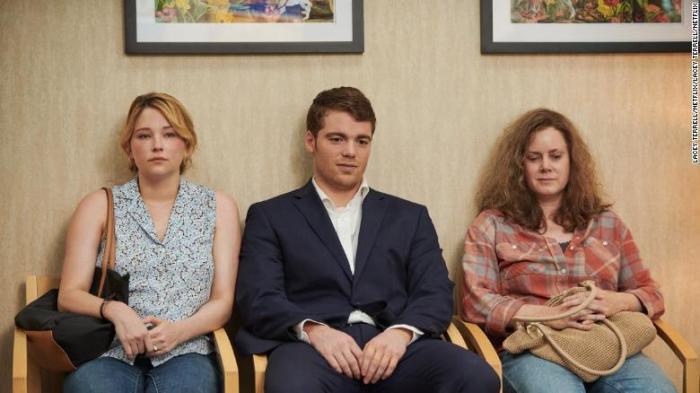'Hillbilly Elegy' highlights 'shared humanity,' says director Ron Howard

The film adaptation of “Hillbilly Elegy” seeks to highlight the importance of family, loyalty, and sacrifice while taking a realistic look at the struggles facing many working-class Americans, according to Academy Award-winning filmmaker Ron Howard.
Howard’s Netflix-produced adaptation of J.D. Vance’s bestselling memoir stars Amy Adams, Glenn Close and Gabriel Basso. It details Vance’s tumultuous upbringing in deep Appalachian Kentucky and the Rust Belt of Ohio, his unlikely escape from destructive behavioral cycles, and his efforts to grapple with his mother’s opioid addiction.
Rated R for language throughout, drug content, and some violence, "Hillbilly Elegy" tackles issues of white poverty, drug addiction, and domestic violence. But it's also a bittersweet drama that examines the importance of family, indomitable strength, and triumph over adversity.
In an interview with The Christian Post, Howard, who is behind the critically acclaimed dramas “A Beautiful Mind” and “Apollo 13," said that though his family is from rural Oklahoma rather than Appalachia or the Rust Belt, the attitudes, spirit, and foibles of Vance’s family “felt familiar” to him.
“I kind of related to the cadences and the spirit and nature of those characters,” he said.
But more importantly, the award-winning director said he was interested in both the complexity of the family and the specifics of their particular struggle and the universal, common, relatable aspects they presented.
“They're sort of one and the same,” he said. “I felt like [when we] understand and look at things with a perspective of shared humanity, there's a value in that. And I found that in this story.”
Watch Ron Howard discuss "Hillbilly Elegy" with The Christian Post.
Flashing back and forth from Vance’s youth, adolescence, and young adulthood, “Hillbilly Elegy” opens in rural Kentucky in the mid-90s, when a young Vance is dealing with his family’s dysfunction. It then fast forwards 14 years, when a now-college age Vance (Basso) is working three jobs to put himself through school and interviewing for internships at Yale Law.
But Vance’s past comes back to haunt him when his abusive and troubled mother, Bev, (Adams) is hospitalized for a heroin overdose. Now grown up, Vance is forced to drive from New Haven to Ohio to help his sister Lindsay (Haley Bennett) address his mother’s addiction, facing his own demons in the process.
The unexpected hero of “Hillbilly Elegy” is Bev’s mother, Bonnie, universally known as Mamaw (Close). Though impoverished and in poor health, tough-love Mamaw sacrifices her own comforts to help her grandson succeed.
Howard said he was particularly struck by Mamaw, who he described as an “amazing figure,” simultaneously “colorful, flawed, hilarious” and “truly heroic.”
“At a time when she was not at her best physically, and she could have checked out ... she really rose to the occasion, in a way that changed the history of the family in a really significant way,” he said.
Mamaw’s sacrifice, Howard added, “is not the kind of stuff that would ever make the nightly news, but it's the kind of stuff that makes a difference in families all over the world.”
“She's culturally specific,” he said of Mamaw. “Those who are from the region will recognize her spirit and her nature, and that's great. But there are versions of Mamaw and people like [her] that make those kinds of powerful decisions to make a difference in the life of somebody that they care about all over the world.”
Howard noted that “Hillbilly Elegy” effectively recognizes that “in certain parts of our country, people who are assumed to be either all-right, or we just don't really think about” are actually “facing some real economic hardship.”
“The particulars of their region are traumatizing, and that creates all kinds of problems,” he said. “You have to recognize it first before you can start finding the solutions.”
While those living in cycles of abuse must “take some agency” to “move beyond the baggage of their environment,” and “family patterns of dysfunction,” "Hillbilly Elegy" is not, Howard stressed, a “pull yourself up by the bootstraps story.”
“JD doesn't feel that way, and I don't feel that way,” he stressed.
Instead, it’s an ode to the women in JD’s life — his grandmother, sister, girlfriend, and even, in some instances, his mother — who supported and guided him, eventually allowing him to succeed. Now married, Vance, who executive-produced the film, went on to serve in the U.S. Marines before attending Ohio State University and Yale University.
“I really appreciate that about their story, and their willingness to share it with all of us,” Howard said. “It was a really interesting, creative challenge, but something I was grateful to take on.”
“I hope people can see it and find something of themselves in it, and maybe view things a little differently than they had before they watched the film,” he added.
“Hillbilly Elegy” is now streaming on Netflix.




























